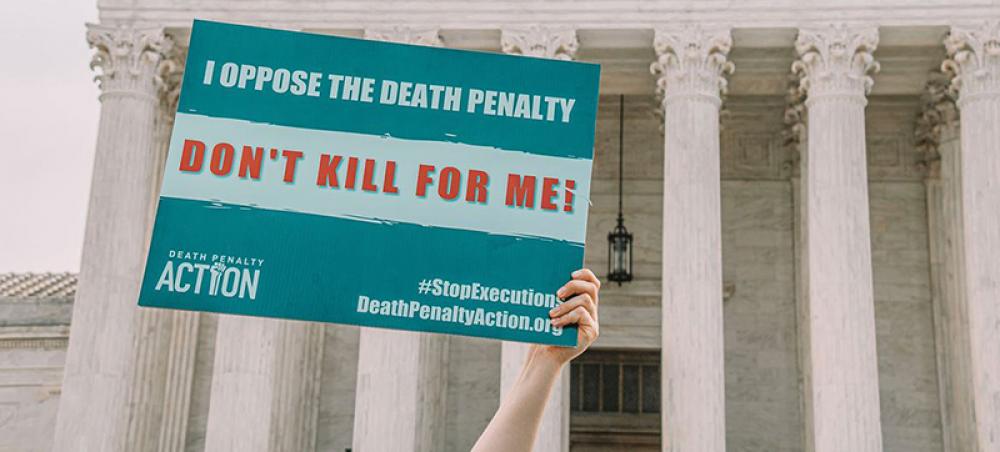Just Earth News | @justearthnews | 01 Mar 2023, 03:24 am Print

Image: Unsplash/Maria Oswalt
New York: The UN High Commissioner for Human Rights on Tuesday asked all nations to work harder towards abolishing the death penalty, an ongoing practice in 79 countries.
The biennial panel’s theme is human rights violations relating to the use of the death penalty, in particular with respect to limiting the practice to only the most serious crimes.
Promise of the Charter
Volker Türk said this is ultimately about the United Nations Charter’s promise of the highest standards of protection of all human beings, in the spirit of the Universal Declaration of Human Rights, which marks its 75th anniversary this year.
“Opponents to a death penalty moratorium say that the rights of victims risk being overlooked; they assert that retribution is the best response,” he said, wondering aloud where the humanity lays in revenge. “Are we not debasing our societies by depriving another human being of their lives?”
Experts in criminal justice, drawing on experience worldwide, advise that the proper response rests in controlling and preventing crimes, he said. They recommend building functioning, human rights-based criminal justice systems that ensure accountability for perpetrators and afford victims and survivors access to justice, redress, and dignity.
The UN rights chief also urged governments to collect, analyze, and make available public data on its use and actual effectiveness.
Challenges and achievements
Achievements towards the goal of abolishing capital punishment can be seen across different regions of the world, the UN rights chief said.
Idrissa Sow, who chairs the African Commission on Human and Peoples’ Rights’ working group on the issue, said the African Union is considering a draft protocol to the Charter on the Abolition of the Death Penalty, 26 nations have totally abolished the practice and 14 others are applying moratoria.
“Despite all efforts made, the death penalty continued to be pronounced on the African continent, with clear risks of judicial error,” he said, noting that more than half of all African nations still implement capital punishment. To address that, he underlined a need to develop partnerships with other national and international institutions to move towards universal abolition.
The Government of Malaysia is moving towards abolishing its mandatory death penalty, said the country’s Minister for Law and Institutional Reform, Azalina Othman Said.
“While the death penalty itself was not completely abolished, the abolition of the mandatory death penalty was a balance between what was right and wrong,” she said.
77 nations falling short
Mai Sato, Associate Professor at the Faculty of Law at Monash University in Australia, said that only two of the 79 countries implementing the death penalty adhere to international standards restricting the practice to the most serious crimes.
Yet, the remaining 77 countries failed to meet the “most serious” standard, she said, with 11 nations implementing the death penalty for capital offences that should not be criminalized at all, including adultery, “so-called religious offences”, and same-sex sexual acts.
Striking a balance
Sarah Belal, who heads the non-governmental organization Justice Project Pakistan, noted that nearly 4,000 people are on “death row” there, relating to 30 current capital offences, saying that every country’s journey towards abolition or compliance with international standards is tethered to their own sociocultural context.
When Pakistan lifted its seven-year death penalty moratorium in 2014 following a devastating terrorist attack, 325 people on death row were executed in 2015, she said. However, years of strategic advocacy and increased engagement with international human rights law “raised the political cost of executions”, she said, noting that no executions have been conducted since 2019.
Divergent perspectives
Following the panel presentations, speakers raised divergent views. Highlighting the lack of consensus on the issue, some delegates reiterated that there is no international law prohibiting capital punishment. Calling for respect of cultural particularities and religious beliefs of all, some delegates said all States have the right to determine their own legislation.
Many speakers voiced support for moves towards abolition. Some delegates said the death penalty should not be instrumentalized by any State to punish individuals participating in demonstrations and strike fear into the population.
On the right path
“There is a clear international trend towards the abolition of the death penalty.” said José Santos Pais, a member of the UN Human Rights Committee, a body of independent experts that monitors State parties’ implementation of the International Covenant on Civil and Political Rights.
“States with different legal systems, traditions, cultures, and religious backgrounds, from all regions, have abolished the death penalty, established a moratorium on executions, or suspended executions for more than 10 years,” he added.
The UN rights chief reiterated that “until every nation abolishes the death penalty, the road to defending human dignity will never be fully complete.”
A record 125 nations had voted in favour in December of the General Assembly’s resolution, supporting a global call for a worldwide moratorium on the use of the death penalty with a view towards its ultimate abolition.
“That is a landmark, and sign of genuine advance,” Mr. Türk said. “If we maintain this momentum to eradicate this inhumane punishment once and for all, we can weave a thread of dignity back into the fabric of our societies.”
- Viral Irish food bank photo sparks shocking racist attacks on Indians
- Caught on camera: Two foreigners assaulted in Israel in an alleged racial attack
- Pakistan: Parents heartbroken after court sides with man accused of kidnapping minor Christian girl
- Pakistan: Trafficked 35 years ago, Bangladesh-born woman approaches court against FIA for offloading her from flight!
- Hindu tea worker found bound and bloodied in Bangladesh garden during general elections; investigation underway





-1763561110.jpg)
